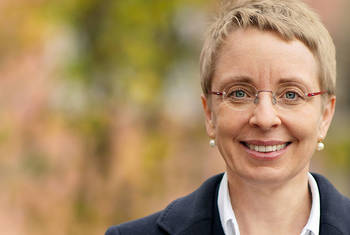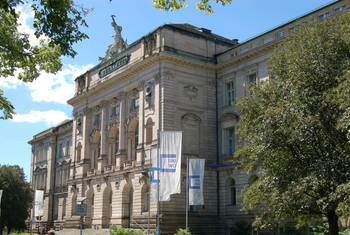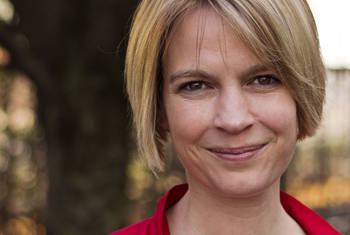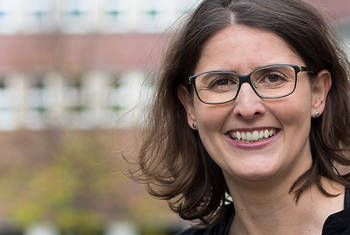Franziska Jundt Is Physical Activity an Effective Treatment for Bone Cancer?
Franziska Jundt is Professor of Hematology and Internal Oncology at Julius-Maximilians-University in Würzburg. She is also a senior physician and leader of the Autologous Stem Cell Transplant division at the University Hospital, Würzburg. In addition, she leads the Multiple Myeloma Center at the Referenzzentrum Nordbayern and the research group Molecular Targeted Therapies in Lymphoma at the Comprehensive Cancer Center. Having studied in Boston and San Francisco, Jundt received her M.D. from Nobel Laureate Harald zur Hausen at the German Cancer Research Center in Heidelberg. Key foci in Jundt’s research and clinical practice include stem cell transplantation, bone regeneration and multiple myeloma. Having won Berlin Charité’s research prize in 2002, Jundt is currently part of the Women’s Leadership Program at the University of Würzburg.
Area of Research
Hematology
since 2013
Professor
University of Würzburg (Julius-Maximilians-Universität Würzburg) (more details)
Hematology and Internal Oncology
since 2015
Head
University Hospital, Würzburg
Center for Multiple Myeloma at the Center for Rare Diseases - Reference Center Northern Bavaria
since 2013
Head of Department
University Hospital, Würzburg
Autologous stem cell transplant and senior physician at the Medical Clinic and Polyclinic II
since 2013
Head of the working group
University of Würzburg (Julius-Maximilians-Universität Würzburg) (more details)
In cooperation with the University Hospital Würzburg: „Molecular Targeted Therapies in Lymphoma“ (Comprehensive Cancer Center)
2001-2013
Research Assistant
Charité - University Medicine Berlin (Charité - Universitätsmedizin Berlin)
Focus on Hematology, Oncology and Tumor Immunology
1999-1999
Postgraduate Researcher
Technical University of Munich (Technische Universität München)
Medical microbiology and immunology
1997-2001
Scientific Associate
Charité - University Medicine Berlin (Charité - Universitätsmedizin Berlin)
Focus on Hematology, Oncology and Tumor Immunology, Max-Delbrück-Centrum für Molekulare Medizin
2007
Specialization
Hematology and Internal Oncology
2005
Postdoctoral Lecture Qualification
Charité - University Medicine Berlin (Charité - Universitätsmedizin Berlin)
Thesis: Molecular Defects in the Pathogenesis of Malignant Lymphomas and New Therapeutic Approaches
2005
Specialist in Internal Medicine
1996
M.D.
Heidelberg University (Ruprecht-Karls-Universität Heidelberg)
Thesis: Transcriptional Regulation of the Human Papillomavirus Type 18 - Role of Transcription Factor YY1
1989-1996
Study of human medicine
Heidelberg University (Ruprecht-Karls-Universität Heidelberg)
Further Clinical and Research Stays: Boston, San Francisco, Birmingham, Catania
- American Society of Hematology
- Deutsche Gesellschaft für Hämatologie und Onkologie
- Deutscher Hochschulverband
Prizes
- Karl-Mussoff Award (2001)
- Research Award of the Berliner Charité (2002)
- Young Masters Award of the German and Austrian Society for Hematology and Oncology (2005)
Fellowships
- Women´s Leadership Program, University of Würzburg (2019-2020)
- German Academic Scholarship Foundation (1991-1996)


University of Würzburg (Julius-Maximilians-Universität Würzburg)
Würzburg, Germany"True to its motto ‘Science for Society’, the Julius-Maximilians-Universität Würzburg (JMU) - founded 1402 - is committed to advancing research in a wide range of disciplines. Academic rankings confirm the JMU’s place among the world’s high-performing research universities. Currently, the JMU has about 29.000 students who are enrolled in ten faculties. Its academic and administrative staff comprises more than 4.000 people. Approximately 420 professors are active in research and teaching at the university and the university hospital.
Institute
Universitätsklinikum Würzburg
High-quality medical care and cutting-edge research
The University Hospital of Würzburg consists of 19 clinics with policlinics and three autonomous policlinics as well as four clinical institutes. About 74.000 stationary and 270.000 ambulant patients have been taken care of per annum (2019). In addition the interdisciplinary cooperation in clinical centers, for example in the Comprehensive Cancer Center Mainfranken, takes center stage.
Map
Current pharmacological treatments for bone cancers like multiple myeloma have proven ineffective at healing bones or regenerating bone tissue. In this video, FRANZISKA JUNDT explores the extent to which physical stimuli and physical activity could represent effective treatment strategies for such conditions. Jundt explains how work with mice infected with tumor cells was followed up by a pilot clinical study on patients with a precursor condition to multiple myeloma, monoclonal gammopathy of undetermined significance. The work demonstrates that physical stimuli can have anti-tumor effects and it provides a scientific basis for a targeted use of sports against bone cancer. Ongoing research will analyze how physical activity has an effect on bone at the genetic level.
LT Video Publication DOI: https://doi.org/10.21036/LTPUB10897
Mechanical Loading Prevents Bone Destruction and Exerts Anti-Tumor Effects in the MOPC315.BM.Luc Model of Myeloma Bone Disease
- Maximilian Rummler*, Fani Ziouti*, Alice L. Bouchard, Andreas Brandl, Georg N. Duda, Bjarne Bogen, Andreas Beilhack, Maureen E. Lynch, Franziska Jundt* and Bettina M. Willie*
- (*These authors contributed equally) Acta Biomaterialia.
- Published in 2020
Impact of Whole-Body Vibration Exercise on Physical Performance and Bone Turnover in Patients with Monoclonal Gammopathy of Undetermined Significance
- Lothar Seefried, Franca Genest, Johanna Strömsdörfer, Bernhard Engelmann, Constantin Lapa, Franz Jakob, Freerk T. Baumann, Billy Sperlich and Franziska Jundt
- Journal of Bone Oncology
- Published in 2020








